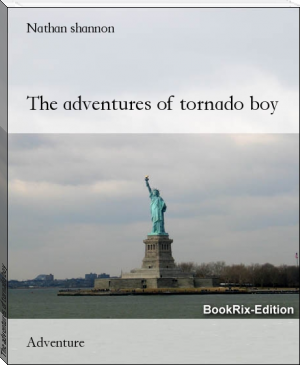The Lost City, Jr. Joseph E. Badger [spicy books to read txt] 📗

- Author: Jr. Joseph E. Badger
- Performer: -
Book online «The Lost City, Jr. Joseph E. Badger [spicy books to read txt] 📗». Author Jr. Joseph E. Badger
now menaced. And as the Sun Children stood before him, in
readiness to comply with the commands issued by those in high
authority, the Red Heron broke bonds.
“Say but one word, Daughter of Quetzal’, and all this shall never
come to pass! Give me but permission to—”
“What wouldst thou do, good Aztotl?”
“Surround the Sun Children with their loyal bodyguard and defend
them, while one brave might strike blow, or hold shield in front
of their sacred charge,” slowly yet fiercely declared the
captain, eyes telling how dearly he longed to receive that
permission.
But Victo shook her head in slow negation. She was still cool of
brain enough to realise how fatal such course would be in the
end. If one deadly blow should be dealt, the end could be but
one,—annihilation to both defended and defenders.
Then, too, she recalled the wondrous tidings brought the evening
before by Ixtli and his comrade. Friends were seeking to rescue
them, and if only time might be won—it must be played for, then!
And so, his petition finally denied, with no other course left
open to take, the Red Heron summoned his picked band and, with
the Sun Children in their midst, left the temple, crossed the
plain, and slowly marched into the War God’s teocalli.
In awed silence a vast number of Aztecs followed that little
procession, silent as they, yet clearly anticipating events of
far more than ordinary importance. And thus the foredoomed women
were taken before the great stone of sacrifice, whereupon lay a
snow-white lamb, bound past the possibility of struggling.
Close beside the prepared sacrifice stood the head priest,
Tlacopa, robed for the awesome ceremony, sacrificial knife in
hand, temples crowned as customs dictated, eyes blazing as
vividly as they might if backed by living fire.
Not far distant stood Huatzin, head bandaged and face none the
better looking for his floundering fall when his sash gave way
the evening before. And as he caught the passing gaze of the
woman whom he had so basely persecuted, a repulsive smile showed
itself, the grin of a veritable fiend in human guise.
Sternly cold, and outwardly unmoved, the captain of guards
performed his sworn duty, then in grim silence awaited the end.
And in like manner each man of that carefully selected band
rested upon his arms.
A brief pause, during which the utter silence grew actually
oppressive, then the head priest lifted a hand as though
commanding full attention before he should speak.
Then, in tones which were by no means loud, yet which were
modulated so as to fill that expanse most perfectly, Tlacopa
recited the grave accusations brought against the false children
of the mighty Sun God.
To their evil influence he attributed the comparative failure of
crops which had now cursed their fair people throughout the past
years. Unto them, he claimed, belonged the evil credit of many
untimely deaths which had covered so many proud heads with the
ashes of mourning and of despair. To their door might be traced
all of misfortune with which the favourite children of the mighty
gods had been so sorely afflicted.
In proud silence Victo listened to this deliberate arraignment,
not deigning to interpose denial, or offer plea in self-defence,
until the paba was clearly at an end. And even then she gazed
upon Tlacopa with eyes of scorn, and lips which curled with
contempt.
A low murmur from the eager crowd told how anxious they were to
hear more, and, taking her cue from that, Victo made a graceful
motion with her white hand, following it by words that sounded
rarely sweet in their deep mellowness, after the harsh, dry notes
of the paba.
“Who dares to bring such base charges against the Daughters of
Quetzal’? Who are our accusers, head priest?”
Did Tlacopa shrink from that queenly presence? If so, ‘twas but
another cunning device intended to pave the way to complete
success; to catch the fickle fancy of his audience by rendering
his retort all the more effective.
“Who dares accuse us of wrong-doing?” again demanded the
Amazonian mother, speaking for her child as well, around whose
waist her left arm was clinging as a needed support.
“The Mother of all the gods!” forcibly replied the priest, now
casting aside all presence of timidity, and gazing into that
proud face with eyes which were filled with fire of hatred and
jealousy. “The all-powerful Centeotl hath made known the awful
truth through the lips of the infallible oracle, my children!
She hath declared that no smiles shall be turned towards the
children of Anahuac so long as false prophets disgrace this great
city! She hath demanded the sacrifice—”
“Who can bear witness to any such demand?” sternly interposed the
captain of the bodyguard, unable to listen longer in silence.
Tlacopa flashed an evil look his way, but from the audience
issued another murmur, rising louder until it took upon itself
the shape of words, demanding indubitable proof that the oracle
had indeed spoken thus. And, no longer daring to rely upon his
own authority, Tlacopa turned to the sacrificial stone whereupon
lay the helpless lamb, bowing knee and lifting face as he volubly
repeated the customary invocation; just then it appeared far more
nearly an incantation.
Having thus complied with all the requirements of his office, the
paba first kissed his blade of sacrifice, then seized the lamb
and turned it upon its back, one hand holding it helpless while
with the other he ripped the poor beast wide from throat to tail,
then, making a swift cross-slash, laid bare the cavity and
exposed the quivering heart.
Dropping his knife, Tlacopa grasped this vital organ, fiercely
tearing it away, drawing back where all might see as be lifted
the heart on high for inspection.
One brief look appeared to satisfy his needs, for he gave a
fierce shout as he hurled the bleeding heart towards the accused,
then cried:
“An omen! An omen! The Mother of the Gods claims her victims!”
CHAPTER XXIX.
BENEATH THE SACRIFICIAL STONE.
Contrary to the expectations of Ixtli escape by way of the War
God’s temple was barred throughout the remainder of that eventful
night. Tlacopa, the head priest, together with a number of his
acolytes, varying as to force, yet ever too powerful for any two
men to force a passage contrary to the will of their leader,
remained on duty each and every hour. And hence it came to pass
that those early hours found our fugitives still beneath the
temple, worn through loss of sleep and stress of anxiety, yet
firmly resolved not to permit that intended outrage without at
least striking one fair blow for the Children of the Sun.
Slowly enough the time passed, yet it could hardly be called
monotonous. Whenever wearied of their darksome waiting, the
young men would steal again into the hollow image of Huitzil’,
there to utilise the cunningly arranged peepholes, now looking
out upon the priests, or listening to catch such words as fell
from the lips of those nearest the stone of sacrifice.
In this manner Ixtli contrived to pick up quite a little fund of
information, mainly through the confidences reposed in a certain
favoured few of the brotherhood by the chief paba. And this, in
turn, filtered through his lips after the chums once again
retreated to the lower regions for both safety and comfort.
And then Bruno learned how the adventurous young Aztec, far less
superstitious than the vast majority of his people, thanks to the
kindly teaching of Victo, Child of Quetzal’, had in his
explorations discovered so many secrets of the temple and
priesthood, secrets which he now had no scruple in communicating
to another of a different race.
Ixtli told how, on various occasions, he had lurked behind the
scenes while the miraculous “oracle” was delivering fiat or
prophecy, and then he told his white brother how Tlacopa meant to
completely confound the Children of the Sun when once brought
before the gods.
“He tell slave what say. Slave come dis way. Hide in War God.
Wait for time, den tell Tlacopa’s words!”
A most infernal scheme, yet the danger of which Bruno could
readily recognise, together with the serious difficulty of
refuting any such supernatural evidence.
“Surely your people will not suffer a few dirty curs to do such
horrible wrong to ladies like—Why, Ixtli, even the gods you
fellows bow the knee to in worship, ought to rise up in their
defence!”
But Ixtli merely sighed, then spoke in sad tones, explaining how
he alone had been taken wholly into the confidence of the Sun
Children. Even the captain of their guards knew Victo and Glady
as but descendants of the great Fair God whom the audacious
trickery of a rival sent far away from the land of his favoured
people, to find an abiding-place in the sun itself.
“He good brave. He die for dem,—easy! But he not know all. He
think drop from sun, to lead people back to light. If think not
so, dat make face turn black; dat make mad come—great big!”
As was ever the case when his feeling seemed deeply stirred,
Ixtli found it difficult to fully or fairly explain his
sentiments; but Bruno caught sufficient of his meaning to give a
fair guess at the rest.
He found a ray of hope in the belief that Aztotl at least would
defend the Children of the Sun, and Ixtli predicted with apparent
confidence that the members of the bodyguard would stand firm
under the Red Heron’s leadership.
Keeping thus upon the alert throughout the remainder of that
night, the young men were able to take prompt action when the
crisis drew nigh.
Ixtli caught the first inkling of what was coming, and hastily
sent Bruno away from the peepholes, dropping a word in his ear as
they both prepared for clean work.
Through a secret entrance, shaped amidst the drapery which
surrounded the pedestal of the mighty Huitzil’, a slave of the
temple crept to play the part of echo to Tlacopa’s evil will; and
scarcely had he secured what was to be a place of waiting and
watching than the attack was made from out the darkness.
Ixtli flung his tunic over the slave’s head, twisting both ends
tightly about his throat, effectually smothering all attempt at
crying aloud for aid, while Bruno clasped arms about his middle,
holding hands powerless to strike or to draw weapon.
A brief struggle, which produced scarcely any noise, certainly
not sufficient to reach the ears of priest or helper, then the
trembling, unnerved slave was bundled down that narrow passage,
to be dumped in a remote corner, and there effectually bound and
gagged by the young men.
All this was performed without hitch or mishap, and then, nerved
to fighting pitch, Ixtli and Bruno went back beneath the stone of
sacrifice, resolved to play their part to the end in manful
fashion.
There was no further fear of intrusion, for, of course, Tlacopa
would never think of endangering his own evil scheme by risking
an exposure such as would follow discovery of his slave-oracle.
As Ixtli truly said, such discovery would end in the paba’s being
slain by his befooled people.
Their patience was sorely tried, even then, though a goodly
portion of the blame belonged to their fears for the Sun
Children, rather than to the actual length of waiting. But then,
amidst the solemn invocations led by the high priest, the
bodyguard marched into the Hall of Sacrifice, and Bruno caught
his breath sharply as he beheld—Gladys! Not her mother, just
then. For





Comments (0)